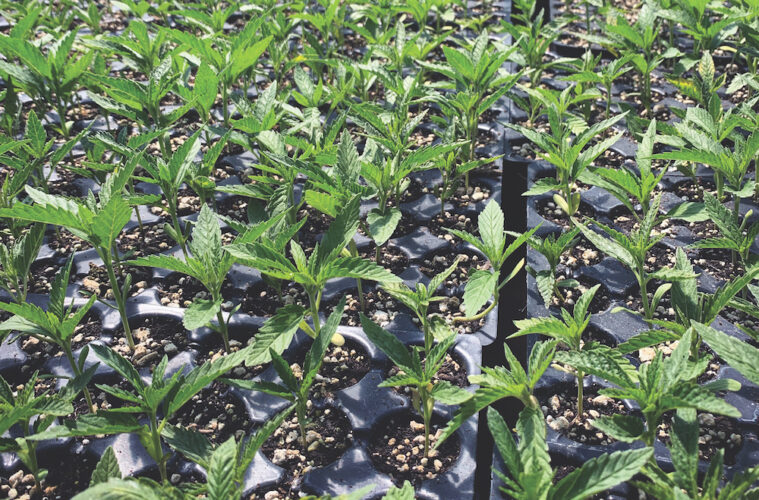HEMP’s advice columnist dishes out hard truths and shares crucial guidance for navigating an industry often awash in misinformation.
This article was originally published in Issue 7 of HEMP in August 2019. Subscribe HERE or find in a local grocery store.
Hi Hemp Hero,
Now that the Farm Bill has passed, I’m thinking about leaving my full-time job to start my own company working with hemp. Any advice for someone who’s brand new to the industry?
Sincerely,
Hemp Newb
Hi Hemp Newb,
Welcome to the wild, fast-paced world of cannabis sativa. While I can’t guarantee that you’ll find success in the growing hemp industry, I can promise you one thing: This industry is never boring.
For everyone else catching up: The 2018 Farm Bill has made it federally legal to cultivate hemp and transport it across state lines — a first for the United States since before World War II. So long as your hemp plants have less than 0.3% THC, you can now develop all kinds of hemp products and share them beyond your home state!
But you’re not the only person who harbors not-so-secret fantasies of working in the hemp industry, so it’ll take some smarts to make sure you can secure a job and find your niche. Here are a few tips I can share before you set off on your journey.
The “Hemp Industry” Means a Lot of Different Things
The first step is to research and identify your focus within the hemp industry. Do you want to grow nutritious and vegan hemp foods? Do you want to supply real estate developers with eco-friendly, super-strong building materials made from hemp? Do you want to extract CBD from hemp or develop your own wellness products?
For Jennifer Babaian, founder and CEO of 7 Leaf Clover, a chain of “hemp-wellness” shops in New York state, pivoting from a health and vitamins focus to hemp was about fulfilling a need she was hearing from her clients, rather than fulfilling a quest to work with a specific product or imagining what people might need.
“Maybe five years ago, we had a large influx of customers who have children with autism who began asking a lot of questions about CBD,” she told me over the phone. “And we didn’t really have a lot of feedback for them because we didn’t know a lot. But we just kept on getting requests from these parents who were desperate to do anything to ameliorate their children’s lives in any way possible. They cared about what we think because they had come to us for so many years for their other vitamin needs.”
She and her business partner began researching cannabidiol. They asked: What constitutes a dose and how is it consumed? What kinds of ailments could it treat and are there any contraindications? Who is creating trusted, regulated products her clients could trust to give their children?
It’s absolutely crucial that you engage in this level of research before jumping in. Do not assume that because the laws are in flux, you’re a pioneer — entrepreneurs have been staking a claim in the hemp world for a while.
Location, Location, Location
It’s also important to understand who has already set up a competing business in your market, whether they’re in your state or not.
In Oregon, for example, cannabis cultivation licenses weren’t limited to local growers and non-local farmers flooded the market, which drove the price of cannabis down without enough people to sell all of their product to. You can imagine how eager this contingent must be to access markets outside of the state — but also how these entrepreneurs have had time to perfect operations, scale their businesses up, and form all-important relationships that could make or break the next phase of growth.
Connecting with Your Network
That brings me to my final, all-important tip: Find your people.
Who are “your people”?
They’re individuals in your professional network who share your values and will help reinforce the kind of company you want to build through both solicited and unsolicited advice (also known as friendship in non-professional settings!).
Babaian says that this is what surprised her most of all about the hemp industry when she first joined it: How frequently she came across people that didn’t share her values as she started sourcing brands to supply her stores.
“We tested products that came back with synthetic marijuana, but that had ‘all-natural’ on the label,” she says. “The lack of integrity in the space was mind-blowing. There was no huge incentive to be so dishonest. And also having done our research about edibles being made in batches instead of individually infused — like there’s just a right way and a wrong way of doing this, it was just really distasteful, not from an elitist perspective, but from a serving your community and doing right by your customers kind of thing.”
Do your due diligence and do your absolute best to develop professional relationships with people who share your values and goals. You’ll serve your yourself — and your customers — much, much better as a result.
Stay green,
Hemp Hero



 Kate Robertson is a freelance journalist based in Toronto. Before developing a cannabis beat, she was the online and social media manager at Toronto’s alt-weekly NOW Magazine where she was nominated for a Digital Publishing Award. She also writes an advice column, Weedsplainer, at Lift & Co.
Kate Robertson is a freelance journalist based in Toronto. Before developing a cannabis beat, she was the online and social media manager at Toronto’s alt-weekly NOW Magazine where she was nominated for a Digital Publishing Award. She also writes an advice column, Weedsplainer, at Lift & Co.